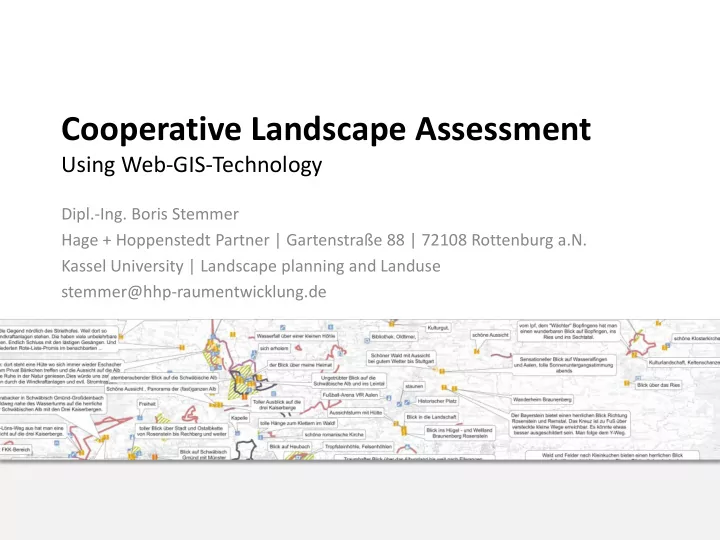

Cooperative Landscape Assessment Using Web-GIS-Technology Dipl.-Ing. Boris Stemmer Hage + Hoppenstedt Partner | Gartenstraße 88 | 72108 Rottenburg a.N. Kassel University | Landscape planning and Landuse stemmer@hhp-raumentwicklung.de
Introduction / Problem statement 2
Theory of Landscape Perception – The Socio-Constructivist Perspective 3 Scoco-Constructivist Landscape Theory by K ÜHNE (2006, 2011) and I PSEN (2006) (S TEMMER 2015)
Theory of Landscape Perception – The Socio-Constructivist Perspective Physic Dimension of Landscape Scocial Dimension of Landscape Individual Dimension von Landscape 4 Konstruktion von Landschaft nach K ÜHNE (2006, 2011) und I PSEN (2006) (S TEMMER in Vorbereitung)
Approach landscape assessment Communalities of based on expert Valuable Landscapes expert and public knowledge (cultural selected by people. landscape assessment. landscape, vegetation, (Which landscape do What knowledge is viewshed) you like best?) gained by public landscape assessment? Landscape descriptions by public. (What do you like about that landscape? What do you do there?) 5
Approach What elements of ‘physical space’ do people refer to? What activities do people describe for certain areas? Are there any hints to homeland or the feeling of identity in the texts? GIS Analysis (Geodata) Content Analysis (Text) 6
Outcomes - Hotspots 7
Outcomes - Elements of ‘Physical Space’ 8
Outcomes - Elements of ‘Physical Space’ 9
Outcomes - Activities 10
Outcomes – Activities 11
Outcomes - Identity / Emotion 12
Conclusions Constructivist landscape theory helps to systematically analyse public landscape perception. Public landscape perception thus can enhance experts landscape evaluation. Large amounts of empirical data are still missing. How much publically generated data might be considered sufficient? What degree of representativeness? Raising the numbers of participants and including all parts of society. 13
Outlook 14
15
Literature Ipsen, Detlev (2006): Ort und Landschaft. Wiesbaden: VS Verlag für Sozialwissenschaften | GWV Fachverlage GmbH Wiesbaden. Kühne, Olaf (2006): Landschaft in der Postmoderne. Das Beispiel des Saarlandes. Wiesbaden: Dt. Univ.-Verl. Stemmer, Boris (2015): Kooperative Landschaftsbewertung in der räumlichen Planung. Sozialkonstruktivistische Theorie als Grundlage einer Herangehensweise zur Mitwirkung der Öffentlichkeit bei der Bewertung von Landschaften. Dissertation an der Universität Kassel unter dem Titel: Neue Landschaftliche Leitbilder - Landschaftsbewertung durch Web-GIS-basierte Kommunikationstechnik: Springer. 16
Outcomes - Identity / Emotion 17
Recommend
More recommend